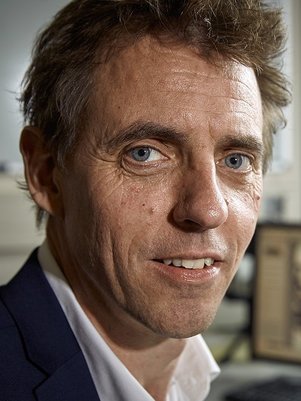Prof. dr. H.M. (Henk) Jonkers
Profile
2024 - Now: Departmental Director Materials, Mechanics, Management & Design
2021 - Now: Professor Bio-adapted and Sustainable Building Materials
2006 - 2021: Researcher/Assistant/Associate Prof Delft University of Technology
1999 - 2006: Researcher Max Planck Institute for Marine Microbiology, Bremen
1994 - 1999: PhD Marine Microbiology, Groningen University
1983 - 1989: MSc Marine Biology, Groningen University
Research
My research focusses on the development of bio-adapted building materials. These are materials that contain, or stimulate growth of, living organisms resulting in increased functional performance and decreased environmental impact. Examples are bacteria-based self-healing concrete and moss-receptive concrete. Further research focus is on implementation of nature in the built environment with the aim to increase wellbeing of humans, quality of nature, and climate resistance of built structures. Development of circular building methods and strategies aiming to decrease use of finite raw materials and emission of harmful substances as well as biodegradation mechanisms of building materials are also part of the research portfolio.
Responsible for:
- CT 3602 - Analysis of materials, energy and water flows in a linear and circular economy
- CIE 4100 - Materials and Ecological Engineering
Contributing to:
- CTB 1320 - Construction Materials and Sustainability
- CT 3601 - Environmental Technologies and Sustainable Design - Research assignment
- CT 3604 - Biomass nutrients and energy conversion
- 4413IEPR1 - Industrial Ecology Project - Urban Systems
- Jonkers HM (2007) Self-healing concrete: a biological approach, p. 195-204. In: S. van der Zwaag (ed) Self Healing Materials: an introduction. Springer, The Netherlands.
- Jonkers HM, Thijssen A, Muyzer G, Copuroglu O & Schlangen E (2010) Application of bacteria as self-healing agent for the development of sustainable concrete. Ecological Engineering 36(2): 230-235
- Wiktor V & Jonkers HM (2011) Quantification of crack-healing in novel bacteria-based self-healing concrete, Cement and Concrete Composites 33 (2011) 763-770
- Sierra-Beltran MG, Jonkers HM & Schlangen E (2014) Characterization of sustainable bio-based mortar for concrete repair. Construction and Building Materials 67:344-352
- Mors RM & Jonkers HM (2017) Feasibility of lactate derivative based agent as additive for concrete for regain of crack water tightness by bacterial metabolism. Industrial Crops & Products 106: 97–104
- De Belie N, Gruyaert E, Al-Tabbaa A, Antonaci P, Baera C, Bajare D, Darquennes A, Davies R, Ferrara L, Jefferson T, Litina C, Miljevic B, Otlewska A, Ranogajec J, Roig-Flores M, Paine K, Lukowski P, Serna P, Tulliani J-M, Vucetic S, Wang J & Jonkers HM (2018) A Review of Self-Healing Concrete for Damage Management of Structures. Adv. Mater. Interfaces 2018, 5 (17), 1-28
- Palin D, Yu Mo, Wiktor V & Jonkers HM (2019) An Improved Test for Generating Rapid, Accurate, and Reliable Crack Permeability Data for Cementitious Materials. International Journal of Civil Engineering 17:645–652
- Kulshreshtha Y, Mota NJA, Jagadish KS, Bredenoord J, Vardon PJ, van Loosdrecht MCM & Jonkers HM (2020). The potential and current status of earthen material for low-cost housing in rural India. Construction and Building Materials 247
- Jonkers HM & Loosdrecht MCM (2010) Special Issue Editorial - Bio-based Geo- and Civil Engineering (BioGeoCivil). Ecological Engineering 36(2)

Henk Jonkers
Professor
- +31 15 27 82313
- h.m.jonkers@tudelft.nl
-
Faculty of Civil Engineering and Geosciences
Building 23
Room: 6.07
Availability:
Monday to Friday
Department:
Materials, Mechanics, Management & Design (3Md)
Section:
Materials and Environment
Chair / Research:
Innovative construction materials & Sustainability
Secretary:
Jacqueline van Unen-Bergenhenegouwen
Prof.dr. H.M. (Henk) Jonkers
- nevenwerkzaamheden
-
-
2017-05-01 - 2025-05-01
Advisering/onderzoek en overig
-
2018-01-01 - 2026-01-01
Advisering/onderzoek en overig